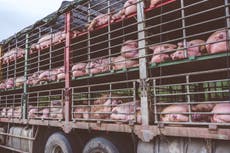UK meat exports will grind to a halt on 1 January even if Brexit deal agreed, industry warns
Industry calls ‘in desperation’ for an extension to current arrangements with EU to avoid chaos
The majority of British meat exports to the EU will have to cease from 1 January, even if a Brexit trade deal is agreed, due to the "sheer volume" of red tape, a meat industry body has warned.
Exporters will not be able to cope with a requirement for every consignment of meat to be certified as safe and disease-free because there aren't enough qualified vets to carry out the work, the British Meat Processors Association (BMPA) said.
It warned that unless the government can persuade the EU to postpone the implementation of Export Health Certificates for individual consignments, UK meat exports to mainland Europe will grind to a halt.
Adding to problems is the fact that there is no procedure for certifying a grouped consignment of meat that isn’t packed for retail. The majority of UK meat exports are not packed for retail, instead going on for further processing and packaging elsewhere, the BMPA said.
A government IT system for processing health certificates is already experiencing problems which are expected to become more severe once the volume of work rises hugely after 1 January.
The industry is asking for a six-month period during which requirements would be gradually phased in to allow problems to be worked through and minimising damage to trade.
Some BMPA members have already said they will not try to export in the first few weeks so that they can wait and see how other producers get on.
Nick Allen, chief executive of the BMPA said he was now calling "in desperation" for what amounts to an extension to the current regime of frictionless access.
“There has been a sense government will put us on the naughty step if we speak up and say we need time to implement this,. We don't even know for sure yet what we will have to implement.”
A meeting this week will decide what health status the EU allocates to UK meat imports. This could result in further requirements such as testing for diseases like tuberculosis before export, although this is considered an unlikely outcome. The industry may not find out until next week, leaving just a few days to prepare.
“We’re on a wing and a prayer that the EU doesn’t do the dirty on us,” said Mr Allen.
Even if the requirements are as expected it still means that every consignment of animal products from the UK must be signed off by a vet.
Most shipments pick up small amounts of meat from multiple different farms and a check is needed at each stage.
“The health certificate system is not fit for purpose. It's meant for huge loads.” said Mr Allen.
"We haven’t got much belief that it is going to work at all, there are just too many problems. The IT system is already creaking. Common sense needs to prevail.
“There needs to be recognition that, with Covid going on as well, something needs to be put in place or there will be chaos.”
Craig Kirby, veterinary adviser to the Association of Independent Meat Suppliers, said that it was widely accepted that there was a shortage of vets.
Defra forecasts that 300,000 safety certificates will be needed; the BMPA thinks it could be several million.
Mr Kirby recently underwent training to sign off the certificates and Defra has provided support in giving more vets the knowledge they need.
“It’s not just about waving stuff through. Vets will be putting their name and reputation on the line with these certificates, they need to know what’s in there.”
He estimated that a certificate will add “a few hundred pounds” to the cost of each load. “The costs will have to be absorbed somewhere along the supply chain.”
If Defra is right and 300,000 certificates are needed, the meat industry could face £100m or more in costs.
The timings of deliveries may also cause a problem, Mr Kirby said. Lorry drivers typically turn up at all hours of the day to farms and meat processors to take cargo across to mainland Europe but now the schedule will have to take into account which times vets are available to sign off certifications.
“We will adapt eventually. There will be problems to start with but we will work it out,” said Mr Kirby.
Join our commenting forum
Join thought-provoking conversations, follow other Independent readers and see their replies
Comments

Bookmark popover
Removed from bookmarks